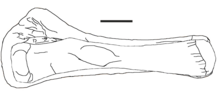Laplatasaurus (meaning "La Plata lizard", named for La Plata, Argentina) is a genus of titanosaurian sauropod dinosaur that lived during the Late Cretaceous in South America, with the holotype and only known specimen found in the Anacleto Formation.
| Laplatasaurus Temporal range: Campanian
~ | |
|---|---|

| |
| Tibia & fibula of Laplatasaurus. Scale bar equals 10cm. | |
| Scientific classification | |
| Domain: | Eukaryota |
| Kingdom: | Animalia |
| Phylum: | Chordata |
| Clade: | Dinosauria |
| Clade: | Saurischia |
| Clade: | †Sauropodomorpha |
| Clade: | †Sauropoda |
| Clade: | †Macronaria |
| Clade: | †Titanosauria |
| Genus: | †Laplatasaurus von Huene, 1929 |
| Type species | |
| †Laplatasaurus araukanicus von Huene, 1929
| |
| Synonyms | |
| |
Naming and description
editThe genus was named in 1927 by Friedrich von Huene, but without a description, so that it remained a nomen nudum.[1] In 1929 the type species, Laplatasaurus araukanicus, was described by Huene.[2] The generic name refers to La Plata. The specific name is derived from the Araucanos or Mapuche. By accident Huene in 1929 also mentioned a "Laplatasaurus wichmannianus" but that was a lapsus calami for Antarctosaurus wichmannianus. In 1933 however, he and Charles Alfred Matley renamed Titanosaurus madagascariensis to Laplatasaurus madagascariensis.[3] This last species is today commonly referred to the original Titanosaurus.
Huene based Laplatasaurus on fragmentary material found in three locations in Argentina, in strata of the Anacleto Formation,[4] dating from the Campanian faunal stage. It consisted of limb elements, some dorsal vertebrae and a series of caudal vertebrae. Part of the finds had earlier been referred by Richard Lydekker to Titanosaurus australis. Huene never assigned a holotype, but in 1979 José Fernando Bonaparte chose MLP 26-306 as the lectotype, a specimen consisting of a tibia and a fibula that perhaps originate from different individuals.
Huene assigned those fossils to Laplatasaurus that seemed to indicate a rather large yet at the same time elegantly built sauropod. The about eighteen metres (60 ft) long Laplatasaurus was perhaps similar to Saltasaurus. Osteoderms forming an armored plating on the back, have been referred to Laplatasaurus but the association is uncertain. These plates had much smaller ridges than those of Saltasaurus.
A Megaloolithus egg found in the Anacleto Formation in Auca Mahuevo, Argentina[5] that was once assigned to Titanosaurus may have instead been laid by Laplatasaurus.
Taxonomy
editHuene placed Laplatasaurus in the Titanosauridae, which is still a common classification. In his 2003 review of South American titanosaurs, Jaime Eduardo Powell assigned Laplatasaurus to Titanosaurus, creating the new combination Titanosaurus aurakanicus.[6] Others however, continued to treat Laplatasaurus as valid genus separate from Titanosaurus.[7][8][9]
A 2015 re-assessment of Laplatasaurus found it to be closely related to Bonitasaura, Futalognkosaurus, Mendozasaurus, and Uberabatitan. The genus was restricted to the lectotype, and the material from Rancho de Avila was assigned to cf. Bonitasaura sp.[4]
References
edit- ^ Huene, F. von, 1927, "Sichtung der Grundlagen der Jetzigen Kenntnis der Sauropoden", Eclogae geologicae Helvetiae, 20: 444-470
- ^ Huene, F. von, 1929, Los Saurisquios y Ornithisquios de Cretaceo Argentino, Anales Museo de La Plata, 2nd series, v. 3, p. 1-196
- ^ Huene, F. von, and Mately C. A., 1933, "The Cretaceous Saurischia and Ornithischia of the central provinces of India", Palaeontologia Indica, 21: 1-74
- ^ a b Gallina, Pablo Ariel; Otero, Alejandro (2015-10-01). "Reassessment of Laplatasaurus araukanicus (Sauropoda: Titanosauria) from the Upper Cretaceous of Patagonia, Argentina" (PDF). Ameghiniana. 52 (5): 487. doi:10.5710/amgh.08.06.2015.2911. ISSN 0002-7014. S2CID 131595654.
- ^ Megaloolithus at Fossilworks.org
- ^ Powell, J. E., 2003, "Revision of South American titanosaurid dinosaurs: palaeobiological, palaeobiogeographical and phylogenetic aspects", Records of the Queen Victoria Museum 111: 1-173
- ^ Wilson, Jeffrey A.; Upchurch, Paul (January 2003). "A revision of Titanosaurus Lydekker (dinosauria - sauropoda), the first dinosaur genus with a 'Gondwanan' distribution". Journal of Systematic Palaeontology. 1 (3): 125–160. Bibcode:2003JSPal...1..125W. CiteSeerX 10.1.1.578.8885. doi:10.1017/s1477201903001044. ISSN 1477-2019. S2CID 53997295.
- ^ Upchurch, P., Barrett, P.M. and Dodson, P. 2004. Sauropoda. In The Dinosauria, 2nd edition. D. Weishampel, P. Dodson, and H. Osmólska (eds.). University of California Press, Berkeley. ISBN 0-520-24209-2, S. 259–322.
- ^ Salgado, L. & Coria, R. A. 2005. Sauropods of Patagonia: Systematic update and notes on Global Sauropod evolution. In. Thunder-Lizards. The Sauropodomorph Dinosaurs. Ed. V. Tidwell & K. Carpenter. Indiana University Press. Bloomington and Indianapolis. Indiana University Press430-453.